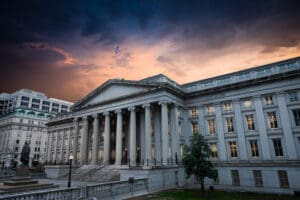The economic crisis caused by the coronavirus pandemic poses a triple challenge for tax policy in the United States. Lawmakers are tasked with crafting a policy response that will accelerate the economic recovery, reduce the mounting deficit, and protect the most vulnerable.
To assist lawmakers in navigating the challenge, and to help the American public understand the tax changes being proposed, the Tax Foundation’s Center for Federal Tax Policy modeled how 70 potential changes to the tax code would affect the U.S. economy, distribution of the tax burden, and federal revenue.
In tax policy there is an ever-present trade-off among how much revenue a tax will raise, who bears the burden of a tax, and what impact a tax will have on economic growth. Armed with the information in our new book, Options for Reforming America’s Tax Code 2.0, policymakers can debate the relative merits and trade-offs of each option to improve the tax code in a post-pandemic world.

TCJA Family Provisions Offer Template for Tax Reform in 2025
The Tax Cuts and Jobs Act’s changes to family tax policy serve as a reminder to avoid looking at tax reform provisions in a vacuum.
5 min read
Worldwide Investment at Risk as Capital Allowances Phase Out
Rather than adopt temporary policies that phase out and expire, policymakers should focus their efforts on long-term reforms to support investment.
6 min read
Conference on Tax Cuts and Jobs Act’s Effects Shows Further Tax Reforms Needed in 2025
Lawmakers should see 2025 as an opportunity to consider more fundamental tax reforms. While the TCJA addressed some of the deficiencies of the tax code, it by no means addressed them all.
8 min read
National Tax Literacy Poll: Understanding the Tax Code
To make sound financial decisions and support better tax policy, taxpayers should understand the taxes they face. Unfortunately, most U.S. taxpayers do not know or are unsure of basic tax concepts.
6 min read
Kansas Lawmakers Should Prioritize Pro-Growth, Structurally Sound Tax Reforms in Special Session
With a robust surplus and plenty saved for a rainy day, Kansas can afford substantial tax relief, but not all tax relief is created equal.
7 min read
Can Economic Growth Help Solve Our Debt Problem?
Improving the country’s fiscal situation won’t be comfortable, but economic growth can help cushion the blow.
3 min read
New Report Identifies Challenges with Global Minimum Tax Implementation in the EU
European Union Member States are in the process of implementing the global minimum tax in line with a directive unanimously agreed to at the end of 2022.
3 min read
Why We’re Closely Watching Moore v. U.S.
The Moore case could have important impacts on tax policy.
5 min read
How Did the Tax Cuts and Jobs Act Change Cost Recovery?
As lawmakers consider which policies to prioritize in the upcoming tax policy debates, better cost recovery for all investment should be top of mind.
7 min read
America Should Learn from Successful Universal Savings Policy Across the Pond
For U.S. policymakers looking to encourage greater saving and financial security, particularly among low- and moderate-income households facing serious affordability challenges, the experiences in both the UK and Canada indicate that universal savings accounts are an effective policy tool to help reach that goal.
4 min read